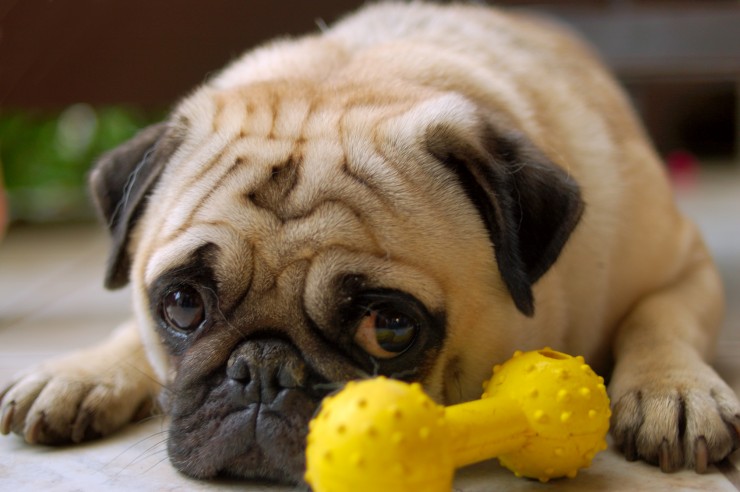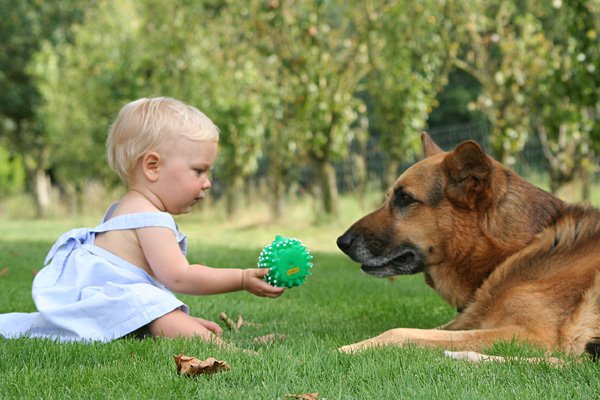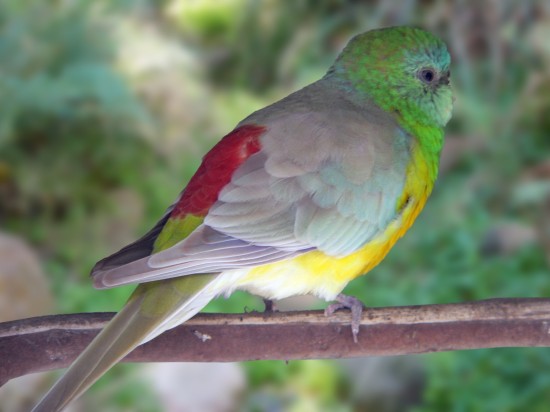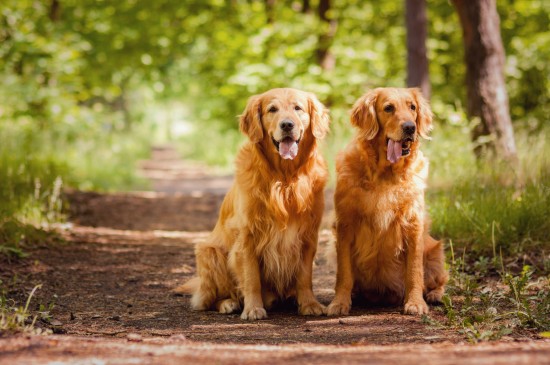
Recently I lost my overly anxious Great Dane/black lab mix to bloat. Unfortunately, with her being a mixed breed, I didn't realize the risk factors for her, nor recognize the early warning signs. I have done some research since and would like to share what I have found in order to help others prevent bloat, especially in anxious dogs.
With this condition, prevention is the best hope. Once your dog has developed bloat, it may be too late to successfully treat and save your dog. I'll delve a little into the condition of bloat to explain what happens, but I would mostly like to stress the importance of what you can do to prevent bloat, especially if you have an anxious dog to begin with.
Bloat occurs when the sphincter between the esophagus and the stomach malfunctions and there is an obstruction of the outflow through the pylorus. The pylorus is a small opening at the base of the stomach, allowing partially digested food to flow out to the duodenum. When this gets clogged for whatever reason, the food can't pass through. With the malfunction of the sphincter closing off the other end, the stomach fills up with air.
The stomach may then torque or twist up to 360 degrees and the dog cannot throw up or otherwise relieve the condition. The only hope of fixing the situation is through aggressive surgery, and even then the outcome is not very promising. The best cure is prevention.
One thing I didn't realize is that overly anxious dogs are at a higher risk of developing bloat than happy easy-going dogs. My dog Zoey was rescued from a very abusive situation and pretty much lived at a high level of fear and anxiety, seemingly waiting for something terrible to happen.
That, coupled with the fact that she was an older dog and had the deep chest of a Great Dane, made her highly susceptible to bloat. Not all dogs have the propensity to fall victim to this condition. It is mainly seen in dogs with deep chests who may be underweight, older, fearful, or overly anxious.
Here are 14 steps you can take for prevention of bloat, especially for anxious dogs:
1. Don't allow your dog to drink water for an hour before or after a meal, but otherwise always have fresh water available.
2. Control your dog's water intake on hot days. Some dogs will drink too much on their own. Only give them a few drinks at a time every few minutes.
3. Feed small portions of food two or three times a day.
4. Control rapid eating by putting a medium to large sized rock in with the food so your dog has to eat around it, but make sure its large enough that it is not eaten as well.
5. Don't feed only dry food - add raw meat when possible.
6. When feeding dry food, look for a kibble that does not have fat as one of its first 4 ingredients and does not have citric acid as a preservative. If you can't avoid the citric acid, do not add water to the kibble.
7. Also when feeding dry food, look for one that has rendered meat meal with bone product as one of the first 4 ingredients.
8. Feed a high quality diet.
9. Don't elevate the food bowl. This is one I would have never thought of, but it seems to be a possible contributing factor in dogs that are possible candidates for developing bloat.
10. Avoid brewer's yeast, alfalfa, or soybean products.
11. Promote good bacteria in your dog's intestinal tract by supplementing with probiotics such as acidophilus.
12. Some people also believe it helps to give a bloat-susceptible dog 1Tbs of apple cider vinegar after each meal to aid in digestion.
13. Avoid subjecting your fearful or anxious dog to highly stressful situations if at all possible. If you can't avoid such things as trips to the veterinarian or boarding your dog or changing your dog's routine, try to make it as low-key as possible. To help calm your overly anxious dog, try using the Original Anxiety Wrap or Thundershirt during times of stress.
14. Keep a product with simethicone in it on hand to give to your dog at the first sign of gas such as belching more than twice. This would be a product like Gas-X, Phazyme or Mylanta Gas (must be for gas, not regular Mylanta).
These are several things to think about if you have a deep-chested dog of the breeds of Great Dane, Doberman, German Shepherd, Weimaraner, Gordon and Irish Setters, Rottweiler and even the Basset Hound.
I don't want to create a sense of fear among dog owners, but rather a sense of awareness. Although these deep-chested breeds are of a higher risk than other purebred or mixed breeds, any fearful or anxious dogs within these breeds are certainly more susceptible to developing bloat. All of these precautions should be taken for these dogs if at all possible. For any dog, it is always best to create a peaceful, calm environment whenever possible to ensure a well-balanced, happy, and healthy existence.
Remember, we are the stewards of these wonderful animals who love us unconditionally. Prevention of bloat in fearful and anxious dogs of these high-risk breeds is far better than trying to attempt a cure when it is possibly too late.
Karleen Lindsey has worked with dogs for many years. In her work as a foster care giver for rescue dogs and in her grooming career, she has encountered many behavior problems. She works extensively to help each dog overcome these obstacles of fear and anti-social behavior, with patience being the main key to success.To find out how you can help your anxious dog, visit her anxiety wraps for dogs site.
 8 Most Annoying Habits Dogs Can Develop
8 Most Annoying H
8 Most Annoying Habits Dogs Can Develop
8 Most Annoying H
 Chicken houses: The biggest Benefits and Comforts Seen and Experienced
Chicken houses: The biggest Benefits and Comforts Seen and
Chicken houses: The biggest Benefits and Comforts Seen and Experienced
Chicken houses: The biggest Benefits and Comforts Seen and
 Red Rumped Parrot
Red Rumped Parrot
Red Rumped Parrot
Red Rumped Parrot
 Ten Picnic And Barbecue Foods Your Dog Should Not Eat
Ten Picnic And Ba
Ten Picnic And Barbecue Foods Your Dog Should Not Eat
Ten Picnic And Ba
 Elbow Dysplasia In Dogs
Elbow Dysplasia I
Elbow Dysplasia In Dogs
Elbow Dysplasia I
Copyright © 2005-2016 Pet Information All Rights Reserved
Contact us: www162date@outlook.com